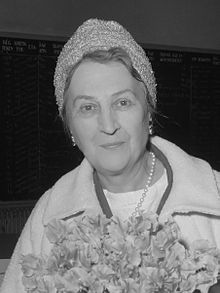Maria Korchinska
Maria Korchinska , also Maria Alexandrowna Kortschinskaja ( Russian Мария Александровна Корчинская , born February 17, 1895 in Moscow , † April 17, 1979 in London ) was a Polish-Russian-British harpist .
Life and musical career
Korchinska was born as the daughter of the Polish civil engineer Lucian Alexander Korchinski, who worked as an official in the Russian Ministry of Transport, and his Moldovan wife Dionysia Janusewitsch. As a child, Korchinska was not particularly interested in music, but because of her talent, she was accepted into the Moscow Conservatory . She fulfilled the high demands of the teaching staff and preferred life at the conservatory over the strictness and tightness of the Catholic home. By the age of eleven, she was so advanced on the piano that her teacher recommended a career as a solo pianist. Her father, however, insisted on training on the harp because he believed that there were many good pianists and only a few good harpists. She studied with Xenia Alexandrovna Erdeli and Alexander Ivanovich Slepuschkin and graduated from the Conservatory in 1911 with a gold medal in the subject of harp. Her teacher Erdeli certified that she was a brilliant virtuoso and had a taste that was beyond any doubt. Korchinska rejected her parents' plans to go abroad. She preferred to stay in Russia and became part of the young, dynamic Kusevitsky Orchestra, which mainly performed new works by Russian artists.
Slepushkin died in 1918, and Korchinska took over the management of the Harp Institute at the Moscow Conservatory. She also became the first female harpist at the Bolshoi Theater . After the October Revolution , she also had to play for numerous Soviet cultural programs, but enjoyed a high status as an artist and musician in the young Soviet Union. Even so, her family suffered from food shortages. She played in the Cheka prisons , for units of the Red Army and at Lenin's funeral; she was repeatedly threatened by the Cheka. In 1922 she became part of Persimfans , the first symphony orchestra without a conductor, a concept that was new at the time and aimed to emphasize the artistic contribution and equality of all ensemble members.
In 1922 she married Count Constantin von Benckendorff , the son of the last tsarist Russian ambassador in London , Alexander Philipp Constantin Ludwig Graf von Benckendorff . After Lenin's death the political situation in the Soviet Union became more complicated and there was concern for Benckendorff's life. Lenin's doctor Otfrid Foerster - it is assumed that he was in love with Korchinska - organized a six-week tour visa for Great Britain for Korchinska, so that she arrived in Tilbury in 1924 with her recently born daughter Natalia and two harps . Her son Alexander was born in 1925 and was granted British citizenship in 1929. She started a new solo career in England, although she had to do numerous other jobs in order to make ends meet with her family. She became known, played mainly new music , gave numerous world premieres and joined the Harp Ensemble . The composer Arnold Bax wrote a sonata for harp and viola for her.
During the Second World War she played under adverse circumstances for the BBC , the Entertainments National Service Association and the Council for the Encouragement of Music and the Arts . After the end of the war she became more involved in ensembles, especially the Wigmore Ensemble , and organized events such as the Dutch Harp Week together with Phia Berghout .
Her students include Dmitri Romanowitsch Rogal-Levizki , Vera Georgievna Dulowa and NB Sibor .
literature
- Nick Lampert: Maria Korchinska: A Sketch (Part I) . In: American Harp Journal . 2016 (English).
- Nick Lampert: Maria Korchinska: A Sketch (Part II) . In: American Harp Journal . 2017 (English, online ).
Web links
- 2 portrait photos of Korchinska in the National Portrait Gallery (London)
Individual evidence
- ↑ a b Н. К. Ончурова: Корчинская, Мария Александровна . In: С. О. Шмидт (Ed.): Московская Энциклопедия, Том 1 - Лица Москвы . tape 2 . Фонд Московские энциклопедии, 2008, ISBN 978-5-903633-01-2 , p. 267 .
- ↑ a b c d Wenonah M. Govea: Nineteenth and twentieth century harpists: a bio-critical sourcebook . Greenwood Press, Westport, Conn. 1995, ISBN 0-313-27866-0 , pp. 145-150 .
| personal data | |
|---|---|
| SURNAME | Korchinska, Maria |
| ALTERNATIVE NAMES | Maria Alexandrovna Korchinskaya; Мария Александровна Корчинская |
| BRIEF DESCRIPTION | Polish-Russian-British harpist |
| DATE OF BIRTH | February 17, 1895 |
| PLACE OF BIRTH | Moscow |
| DATE OF DEATH | April 17th 1979 |
| Place of death | London |
